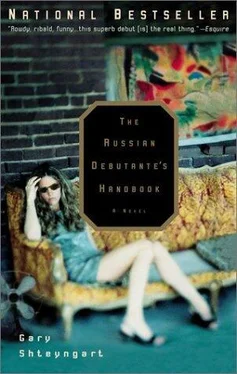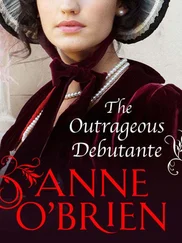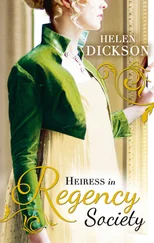Gary Shteyngart - The Russian Debutante's Handbook
Здесь есть возможность читать онлайн «Gary Shteyngart - The Russian Debutante's Handbook» весь текст электронной книги совершенно бесплатно (целиком полную версию без сокращений). В некоторых случаях можно слушать аудио, скачать через торрент в формате fb2 и присутствует краткое содержание. Город: New York, Год выпуска: 2003, ISBN: 2003, Издательство: Riverhead Books, Жанр: Современная проза, Юмористическая проза, на английском языке. Описание произведения, (предисловие) а так же отзывы посетителей доступны на портале библиотеки ЛибКат.
- Название:The Russian Debutante's Handbook
- Автор:
- Издательство:Riverhead Books
- Жанр:
- Год:2003
- Город:New York
- ISBN:0-7865-4177-6
- Рейтинг книги:4 / 5. Голосов: 1
-
Избранное:Добавить в избранное
- Отзывы:
-
Ваша оценка:
- 80
- 1
- 2
- 3
- 4
- 5
The Russian Debutante's Handbook: краткое содержание, описание и аннотация
Предлагаем к чтению аннотацию, описание, краткое содержание или предисловие (зависит от того, что написал сам автор книги «The Russian Debutante's Handbook»). Если вы не нашли необходимую информацию о книге — напишите в комментариях, мы постараемся отыскать её.
and
. The Russian Debutante’s Handbook Bursting with wit, humor, and rare insight,
is both a highly imaginative romp and a serious exploration of what it means to be an immigrant in America.
The Russian Debutante's Handbook — читать онлайн бесплатно полную книгу (весь текст) целиком
Ниже представлен текст книги, разбитый по страницам. Система сохранения места последней прочитанной страницы, позволяет с удобством читать онлайн бесплатно книгу «The Russian Debutante's Handbook», без необходимости каждый раз заново искать на чём Вы остановились. Поставьте закладку, и сможете в любой момент перейти на страницу, на которой закончили чтение.
Интервал:
Закладка:
Displays of wealth, American-style, always made Vladimir feel as if Mother was behind him, whispering into his ear her favorite bilingual nickname for him: Failurchka. Little Failure. Woozy with spite, he leaned against an elevator wall, trying to ignore the rich red glow of Burmese Padauk wood, praying that Rybakov’s apartment would be one hovel of a penthouse, government-subsidized and littered with crap.
But the elevator doors opened to reveal a sunny, cream-colored waiting hall, outfitted with sleek Alvar Aalto chairs and an ingenious wrought-iron torchiere. “Right this way, pork chop…” said Rybakov. “Follow me…”
They gained the living room, which was also inoffensively cream-colored except for what looked like a Kandinsky triptych taking up an entire wall. Beneath the Kandinsky, two sets of sofas and recliners were arranged around a projection television. Beyond was a dining room where an overextended chandelier hung centimeters above a grand rosewood table. As big as the apartment was, the furniture seemed destined for a place even bigger. Just wait and see, said the furniture.
Vladimir took in this tableau as slowly as he could, his gaze settling, of course, on the Kandinsky. “The painting…” Vladimir managed to say.
“Oh, that. It’s just something Miss Harosset picked up at auction. She keeps trying to sell me on abstract expressionism. But just look at that thing! This Kanunsky guy was obviously some sort of a pederast. Ah, let me tell you, Volodya, I’m a simple man. I ride the subway and iron my own shirts. I don’t need money or modern art! A cozy outhouse, some dried fish, a young woman to call out my name… This is my philosophy!”
“Miss Harosset,” Vladimir said. “She’s… your social worker?”
Mr. Rybakov laughed brightly. “Yeah, social worker,” he said. “That’s it exactly. Ah, Volodya, you’re lucky to be so young. Now sit down. I’ll make tea. Don’t let these fool you.” He waved a crutch at Vladimir. “I’m a sailor!”
He disappeared through a pair of French doors. Vladimir sat down at one end of the table, more appropriate for a state dinner than for a sip of tea, and looked around. A string instrument not unlike a Russian balalaika hung on one wall along with several yellowing military certificates. On the opposite wall, there was only a framed black-and-white photograph showing the face of a frowning young man bearing the Fan Man’s thick brows and light green eyes. A cold sore stretched along much of his pouted lower lip like an excavation in progress.
Beneath the photo stood a simple nightstand on which perched a wide-blade fan, its metal chassis gleaming.
“I see introductions are in order,” Rybakov said, wheeling in a cart with a miniature samovar, a bottle of vodka, and plates filled with matjes herring and Riga sprats. “Fan, this is Vladimir. Vladimir, Fan.”
“It’s a pleasure to meet you,” Vladimir said to the Fan. “I’ve heard such wonderful things.”
The Fan said not a word.
“The Fan’s a little tired,” Mr. Rybakov said, stroking the blades with a velvet cloth. “We spent all last night drinking and singing hooligan songs. ‘Murka, oh, my Murka… Oh, my darling Murka… Hello my Murka and goodbye!’ Do you know that one?”
“You betrayed our romance…” Vladimir sang. “Oh, my darling Murka… And for that, my Murka, you will die!”
“What a beautiful voice you have,” Mr. Rybakov cheered. “Maybe we can form a little impromptu singing society. The Red Army Choir in Exile. What do you say, Fan?”
The Fan remained silent.
“Do you know that he’s my best friend?” Rybakov suddenly said of the Fan. “My son’s gone, Miss Harosset’s running around doing the Devil’s work, so who else is there for me? I remember when we first met. I had just landed at Kennedy Airport, my son was being held up in customs—the Interpol fellows wanted to have a little heart-to-heart with him… And then the women from the local Hebrew society came by to give money to the arriving Jews. Well, they took one look at my Christian mug and they gave me a salami instead, and some of that awful American cheese… And then—I guess it was because of the jungle heat that summer—the Hebrews took pity on me and gave me my Fan. He was so spontaneous. Right away, we started chatting like a pair of old shipmates! We haven’t been apart since that day.”
“I haven’t made many friends in this country either,” Vladimir mused quietly. “It’s hard for us Russians to make friends here. Sometimes I get so lonely—”
“Yes, yes,” Mr. Rybakov interrupted, “Very nice, Vladimir, but the day is short, so let us forget our sadness and talk like men.” He cleared his throat, then continued magisterially.
3. FATHERS AND SONS
“VLADIMIR, THE FANwishes to relate to you story. A secret story.”
“Do you like secrets, Volodya?”
“Well, to be truthful—” Vladimir said.
“Sure, everyone likes secrets. Now, our secret story begins with a father and son, both born and raised in the great port city of Odessa. You see, Volodya, a closer father and son there could never be, even though this father, a sailor by profession, was often sailing around the world and had to leave the son in the care of his many lovers. Arrr,” Mr. Rybakov growled with evident pleasure. He settled into a nearby recliner and adjusted the pillows.
“Each long separation weighed on the father’s heart,” he said, closing his eyes. “At sea, he would often conduct imaginary conversations with his son, even if the cook, Akhmetin, that lousy Chechen, would make fun of him mercilessly and undoubtedly would spit in his soup. But then, one day in the late 1980s… guess what happened? Socialism started to collapse! And so, without further thought, the father and son immigrated to Brooklyn.
“Horrible circumstances,” Rybakov complained. “A studio apartment. Spanish people everywhere. Oh, the plight of the poor! Now, the son, Tolya was his name but everyone called him the Groundhog (that’s a funny story too, how he got that name)… Anyway, the son was happy to be reunited with his papatchka, but he was still a young man. He wanted to bring a girl over, to screw her thoroughly from top to bottom. It wasn’t easy on him, believe me. And there was no work around that really took advantage of his natural intelligence. Maybe a few Greeks hired him to blow up their diners for insurance purposes. He was proficient in these matters, so boom boom—” Rybakov took a big slurp of vodka. “Boom boom. He made ten, twenty thousand like that, but still the son was restless. He was a genius, see?” The Fan Man pointed to his head for clarification.
Vladimir touched his own head in agreement. The combination of tea and vodka was making him sweat. He fumbled in his pocket for a tissue, but found only the ten hundred-dollar bills Rybakov had given him. The bills felt crisp, almost starched; for some reason, Vladimir wanted to put them inside his underwear, feel them cosset his privates. “And then the son got a special tip,” Mr. Rybakov went on. “He made a connection. He went first to London, then to Cyprus, then to Prava.”
Prava? Vladimir perked up. The Paris of the 90s? The stomping ground of America’s artistic elite? The SoHo of Eastern Europe?
“Oh, yes,” the Fan Man continued, as if he had sensed Vladimir’s disbelief. “Eastern Europe. That’s where you make the money these days. And sure enough, in a couple of years the son takes over Prava, the cowed natives bending to his will. He runs the taxi racket at the airport, arms contraband from Ukraine to Iran, caviar from the Caspian Sea to Brighton Beach, opium from Afghanistan to the Bronx, prostitutes in the main square, right outside the Kmart. And he sends his lucky father money every week. Now that’s a thankful son. Could’ve put Papa in a nursing home or a psycho farm, which is what children do in these cynical times.”
Читать дальшеИнтервал:
Закладка:
Похожие книги на «The Russian Debutante's Handbook»
Представляем Вашему вниманию похожие книги на «The Russian Debutante's Handbook» списком для выбора. Мы отобрали схожую по названию и смыслу литературу в надежде предоставить читателям больше вариантов отыскать новые, интересные, ещё непрочитанные произведения.
Обсуждение, отзывы о книге «The Russian Debutante's Handbook» и просто собственные мнения читателей. Оставьте ваши комментарии, напишите, что Вы думаете о произведении, его смысле или главных героях. Укажите что конкретно понравилось, а что нет, и почему Вы так считаете.












